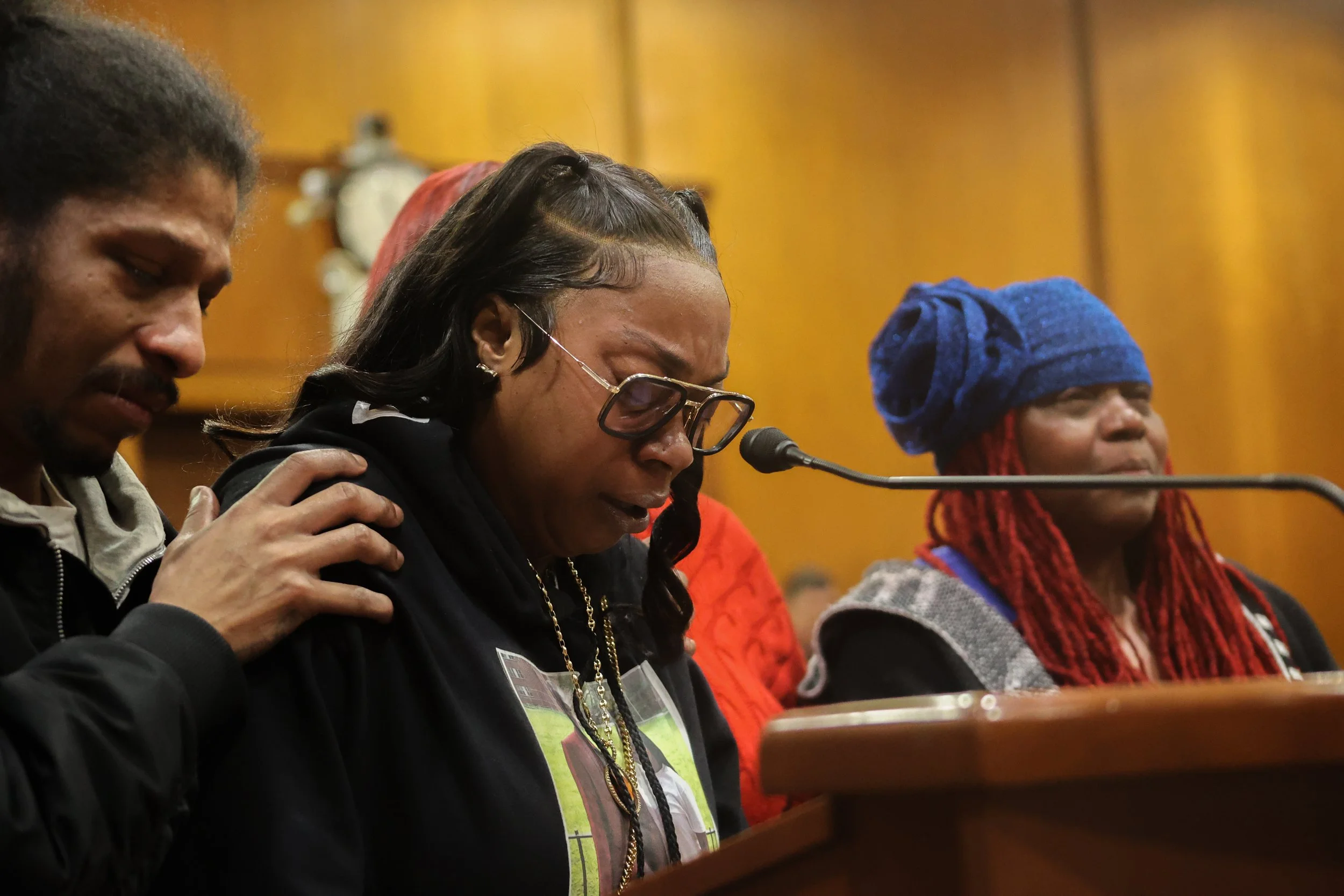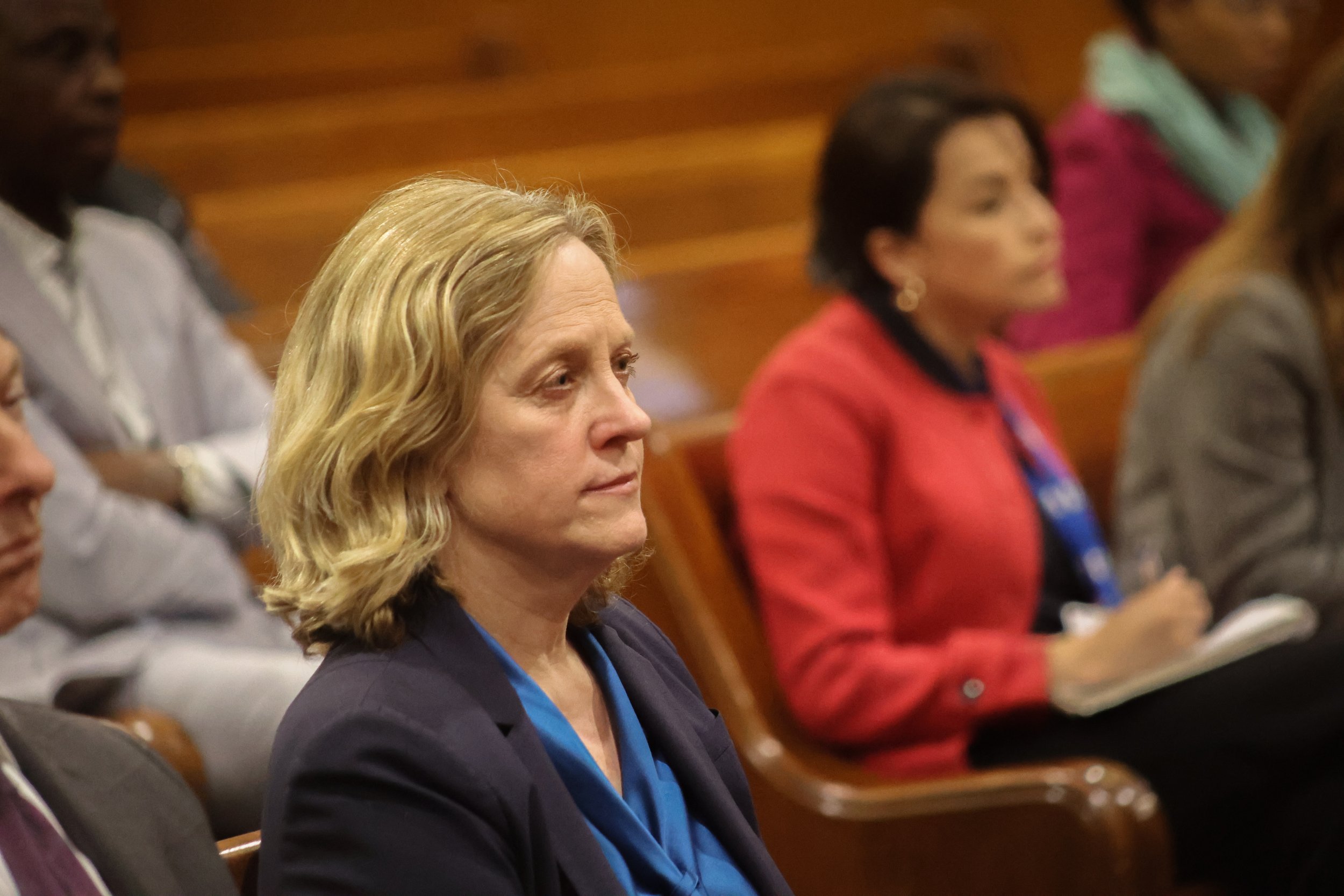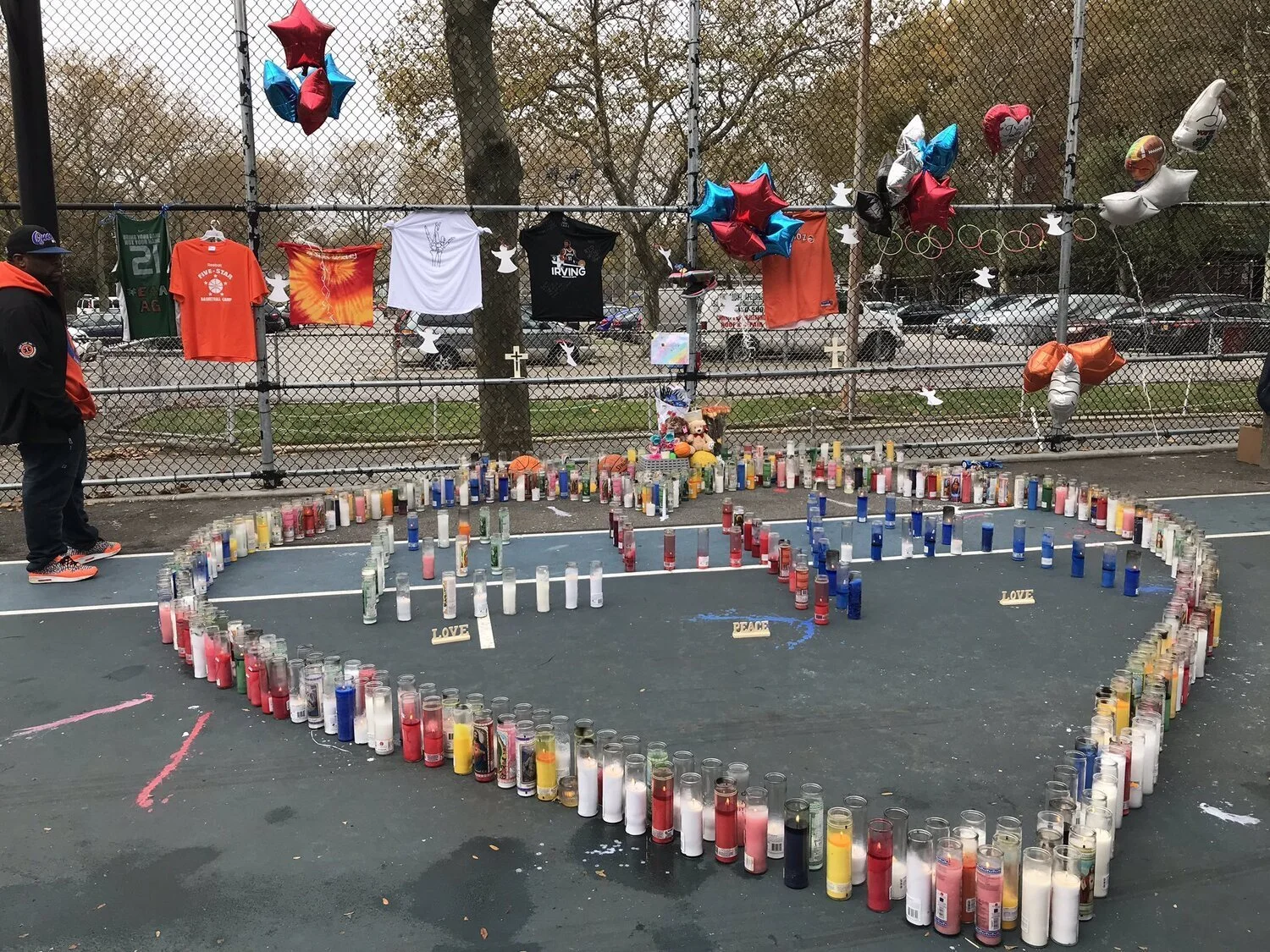Queens killer sentenced for shooting of 14-year-old that sparked gang war
/Shanequa Griffin, the mother of the late 14-year-old Aamir Griffin, speaks at the sentencing hearing of Sean Brown, who will serve 30 years in prison for the boy’s killing in 2019. Eagle photo by Ryan Schwach
By Ryan Schwach
A Queens man was sentenced to three decades in prison on Wednesday for the mistaken murder of a teenager which subsequently sparked a gang feud that turned South Jamaica into a battlefield.
Sean Brown, a 21-year-old man from Jamaica, was sentenced in a Queens courtroom on Wednesday after hearing the emotional appeals from the family of his victim, 14-year-old Aamir Griffin.
Brown gunned down Griffin after mistaking the young basketball player for a rival gang member in October 2019, a “shot heard around the borough” that sparked a bloody, multi-year gang war that resulted in 22 more shootings and another murder.
In March, Brown pleaded guilty to manslaughter, gun and conspiracy charges – a plea deal he attempted to reverse in the courtroom Wednesday – and was sentenced by Queens Supreme Court Justice Kenneth Holder to 30 years in prison and five years of supervision post-release.
Prior to Brown’s sentencing, Griffin's mother and grandmother voiced the pain the shooting had caused them and detailed how the loss of the teenage boy had upended their lives.
“I wanted to see my son become a man, I wanted to see my grandchildren,” said Griffin’s emotional mother, Shanequa Griffin, on Wednesday.
“I’m upset, I’m angry,” she added. “You took my soul from me, I haven't slept for four or five years. I just want it to be over with.”
Griffin was killed by Brown on Oct. 26, 2019 while he was practicing basketball near his home at the Baisley Park Houses in South Jamaica.
Brown mistook him for a rival gang member and fired three shots from a .380-caliber handgun, one bullet penetrating the boy’s upper chest, piercing both his lungs, and killing him.
“My grandson's life was tragically cut short by the actions of Mr. Brown,” said Griffin’s grandmother. “The immense pain and devastation caused by a serious crime has left an indelible mark on my family.”
Through tears, Griffin’s grandmother spoke of his goodness to his neighbors and his dream of one day playing professional basketball, a sport he was already being recruited for.
“The magnitude of this tragedy is beyond comprehension, and our family will forever bear the weight of this devastating loss,” she said. “Mr. Brown, I implore you to understand the gravity of your actions and irreparable damage of course. May God have mercy on your soul for the pain and suffering you have inflicted upon us.”
When asked by reporters how she would want her son remembered, Shanequa Griffin responded, “he played ball.”
Sean Brown was sentenced to 30 years in prison on Wednesday for the fatal shooting of 14-year-old Aamir Griffin in 2019. Eagle photo by Ryan Schwach
Last minute reversal
Moments before he was sentenced, Brown’s attorney informed the court that her client wished to reverse the guilty plea he made in March.
“Mr. Brown feels like he was backed into a corner and didn't have the opportunity to pretty much give it full consideration,” said attorney Camille Russell.
The plea deal got Brown down to 25 years on the manslaughter charge, five years on the conspiracy charge, and five years for the illegal gun. The manslaughter and weapon sentences are to be served consecutively.
At indictment, Brown was looking at 25 years to life.
The 21-year-old changed his plea in mid-March, just as the court was beginning jury selection on the case.
Brown told Judge Holder that he felt he was being “railroaded to a corner” and that by taking the plea deal, he thought it would buy him more time to get a new lawyer.
“My attorney told me that she'd be doing my trial for free, I don't know a lawyer in New York State that's a private attorney, which is doing a trial for free,” Brown said. “I spoke to my family members and they advised me in which I thought me agreeing to make my plea or would buy me more time to get another lawyer.”
In the parking lot following the trial, Russell told the Eagle that though she was free of cost to Brown, she was being paid by the state for Brown’s representation.
“It happens, people are not comfortable with the attorney they have,” she said. “It's just like anything else. If you go to a doctor, and you don't feel comfortable with the doctor, for whatever reason, you try to seek another doctor.”
Queens District Attorney Melinda Katz looks on as 21-year-old Sean Brown was sentenced for fatally shooting 14-year-old Aamir Griffin in 2019. Eagle photo by Ryan Schwach
She said that she advised him on the law and the case, but that he has to make decisions for himself.
Brown hoped that going to trial would come with an acquittal.
“That's what clients tend to hope for, and sometimes they get it and sometimes they don't, but when you go to trial, that is what you hope for,” Russell said.
Russell also told the Eagle that she had submitted Brown’s notice of appeal following the sentencing, despite waiving his right to one with the plea.
Holder however, swiftly denied Brown’s attempt to take back his plea, calling it a “dilatory tactic.”
“There is no basis for me to give you a plea back under the circumstances,” said the 18-year veteran judge.
Holder recalled prior court hearings, saying that in February, Brown made it clear he wanted to go through to trial and replace Russell as his attorney.
In March, Brown had not brought in a new lawyer, as he had said he wanted to, so the trial continued.
“This case has been before me since the indictment was filed on Sept. 9, 2021, and Ms. Russell has been your lawyer ever since that date,” said Holder. “Since that date, she has filed motions on your behalf, and she has vigorously fought on your behalf.”
However, at the jury selection, Brown was able to speak alone with his lawyer, as well as speak to family members before informing the court that he had changed his mind, and would instead be taking the 30-year plea deal.
Holder then recalled his back and forth with the defendant after that decision had been made, ensuring that Brown knew what he was agreeing to.
Holder read allowed directly from court transcripts the exchange he had with Brown when advising him on the consequences of agreeing to a plea deal.
“Are you taking this plea of guilty on these charges because you are guilty of these particular offenses?” Holder asked during the previous hearing
“Yes, Your Honor,” Brown replied.
Ultimately, Holder rejected Brown’s attempt to get a new lawyer and reverse his plea.
Outside the courtroom, District Attorney Melinda Katz told reporters she applauded Holder’s recalling of the record.
“I think the judge made an amazing record, a very solid record of the fact that Sean Brown was involved in every step of his defense, he worked with this attorney, he spoke to his attorney who's involved in the conferences,” she said. “I am convinced that this is a good plea. Thirty years is a good amount of sentencing for this and his family’s closure.”
“We had the death of a 14-year-old child who was just out playing basketball,” the DA added. “He was being recruited by high schools to play on their teams, and he got shot simply because he was in his home court playing ball.”
Griffin’s death, which led to calls from local officials for more funding for community anti-violence programs, also was the starting point for a gang war across South Jamaica between Brown’s Money World Gang and rival gangs.
The gang war allegedly began in April of 2019 and violence is believed to have escalated in October 2019 with the mistaken killing of Griffin.
The shooting of 14-year-old Aamir Griffin on a basketball court inside Jamaica’s Baisley Park Houses sparked outrage throughout Queens. Eagle file photo by David Brand
The war started when two Money World members attacked and slashed a rival Trap Stars gang member on Guy R. Brewer Boulevard.
Prosecutors said that the feud was fueled by social media and rap videos, with members of the gangs bragging about violence and taunting other gangs’ members.
Other than Griffin, 26-year-old Sean Vance was also killed during the feud, a murder which was retribution for another shooting in which Brown himself was wounded. Vance was killed on New Year's Eve 2020 on Sutphin Boulevard.
Vance’s alleged killer, 20-year-old Tymirh Bey-Foster, in September was also indicted in Griffin’s killing.
Last March, Brown was one of 33 reputed gang members charged in what is perhaps the largest gang takedown in the history of the Office of the Queens District Attorney. The wide-ranging 151-count indictment variously charged the defendants with conspiracy, murder and other crimes related to the gang war.
At the courthouse on Wednesday, Holder spoke about the sheer amount of young men involved in the violent crimes in the neighborhood.
“Essentially, the area of South Jamaica seemed to be a shooting gallery that was just taken over completely by these individuals,” he said. “And what is most shocking?...The youth, the age of all of these individuals. Why? Why is so much shooting in the city being done by individuals who appear to be between 16 and 20 years old? It is just ridiculous.”
Holder said that of over 90 cases he has before him, 35 of them involve people in that age range.
“I'm not sure what is going to be done to stop this show – something has to be done,” he said. But as it is right now, protection of the citizens is most important. Because it must be a long-term process, a long-term event that is going to turn around this high that we see here…10 years ago, I couldn't find someone that age.”
Holder also spoke directly to the 21-year-old Brown before him on Wednesday, who was a teenager himself at the time of Griffin’s killing.
“You're not a stupid individual, I know that,” he said to Brown. “But for some reason, you and a lot of the other folks just turn to violence as some way of just taking over their neighborhood or just being just a little bigger than themselves.”
“I think at one point sometime in the future, it is going to hit you because you just ruined your life,” he added. “And your life could have been a lot better than it is now, you could have done so much more with it.”
Katz said that South Jamaica is safer after last year’s sprawling gang indictment, but says there is still more that needs to be done to stop violence in Queens streets.
“We need to make sure that we go after this gang violence, and that this doesn't continue,” she said. “But again, any shooting is too much, and we need to get rid of the gangs. We need to get rid of the guns.”







